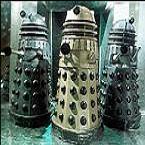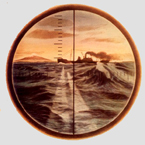IronDuke_slith
Posts: 1595
Joined: 6/30/2002
From: Manchester, UK
Status: offline

|
quote:
Paul,
Whenever "is A better than B" gives a "complex" answer, the reality is that it was a bit narrower than everyone thought IMHO.
quote:
ORIGINAL: Paul Vebber
Complex enough to have a nearly 600 page book written about the "rest of the story" :) Usualy when "A is better than " is assumed cut and dried, its by someone examining the case in hindsight IMHO.
Yes, but this doesn't argue against the sherman being outclassed, it just appeals for more understanding of those who felt it wasn't outclassed in 1944. In other words, hindsight doesn't make us wrong, and it doesn't make the sherman competitive. I'm not saying the americans should have necessarily know better, I'm just commenting on how actuality panned out on the ground.
quote:
If the AORG had tested the Sherman 76 or 75 against the Panther 75, there would have been nothing complex about the answer, would there?
quote:
Hunnicuts book never references any of the datasheets to AORG reports. Given the 17lber was only slightly inferior tothe Panther 75 one would think it would have been a no brainer to just install it, no? Well in the wordsof Hunnicutt:
Jarymowycz though it a little more to do with Americans being sniffy and not wanting British engineering. Devers never even attended the test firing that was organised between the 76, 90 and 17 to show what they could do.
quote:
I'm not extrapoloating anything, its just that I seem to be the only one listening to the Americans on the ground (despite not speaking the language) whilst everyone else tries to tell me everything was fine (albeit only in a complex sense on paper. )
The Sherman wasn't crap in 42/43, it was just relatively obselete by 1944.
quote:
So then you must consider the Panther to be a similar failure, as its early mechanical unreliability resulted in "Germans on the ground" bemoaning its inability to get to battle, and its late armor quality problems that resulted in "Germans on the ground" decrying its vulnerability to 122 and 152 HE. IF "users on the ground" complaining about a weapon are grounds to consider it crap (your words) than pretty much every weapon made has been 'crap' in someone's eyes. Those of us not "listening" are not trying to say 'everything was fine' just that RELATIVE to other SIMILAR vehicles (ie medium tanks) the Sherman was one of the better examples, all things considered, of the war.
Well, the majority of the Panther issues were ironed out. The beast that broke down at Kursk was much improved by mid 44. Secondly, late armour problems or no, where exactly, facing Sherman armed Americans, were Panthers ever going to face 122 and 152 calibre weapons? As for the Sherman being a successful Tank, no argument, but then it was out of its depth by 1944 and its late war success was brought less by its quality than by the bravery of its crews.
quote:
The 75 M4 was a decent vehicle compared to the MKIII and MKIV Panzers, the Valentine series, and the early T-34s. The 76mm was comparable to the Cromwell, the late MKIV Panzers, and was comparable the T-34/85 (very good specimins of which were better, but production quality varied so much that a great deal of them were not due to flawed armor, defective power trains and bad lots of ammo.) Its continued modification and performance in the Arab Isreali wars demonstrated it was hardly obsolete.
A couple of things here. One would have to ask what the Sherman was facing. In Korea, I expect it was T34/85s. In other words, it's survival after the war was in theatres where it faced other Tanks of mid WWII vintage. We could have used it in Iraqi freedom if the Iraqis had been using T-34s and MK IVs they had found somewhere. So, its survival isn't an argument for quality, so much as for the fact that a lot of people had a lot of stock the sherman could compete with left to get rid of.
I generally agree with your comparisons, I do think the late MKIVs better than the M4 75s, but don't like this "comparable to other mediums" argument.
Firstly, I think the "Mediums" thing is not really relevant. I don't doubt the Military might use such terms in procurement discussions, but by 1940, Tanks were surely better defined by their task, not their size. Thus, you had infantry support, Cruiser/Cavalry and recce. I think what had happened by 1944 is that this sort of classification was losing validity (except perhaps for recce) and what was emerging was the MBT. Monty wanted a "Capital" Tank, settled on the Sherman, and tried to use them to fill out all the formations so they all had common equipment. The "Capital" was essentially another term for MBT in this context.
The Germans were essentially arming everything with the biggest AP weapon they could mount and uparmouring. They were no longer following the sort of principles which had delivered the 1940 MK III and MK IV which were very different vehicles. In this context, facing the next generation of German MBTs, which were essentially Tank Killers, the Sherman was obselete because it's main weaponry was not up to the job and never really was.
Now, you can argue it was never designed to be this sort of duelling MBT, and that is valid and fine, but then that reinforces rather than negates the argument it was out of its depth in 1944 because with the odd exception like Cobra, it was less cavalry and more MBT, fulfilling a variety of roles and meeting and suffering against German armour in the process.
Medium is also relative. It was the biggest thing in the American inventory until the rather limited arrival of the Pershing. As such, it faced the Panther which was the Heer's medium (with the Tiger range comprising the heavies). It is alright saying our medium is smaller than their medium, but then that again suggests the issue lies with your medium, not the enemy.
quote:
Interestingly, much of the delay getting the 76mm fielded was taken up problems identified by perhaps too much "listening to the gripes of troops on the ground". While in hindsight a singular focus on "hole-punching" while ignoring the other issues that may have prevented that capability from being effectively used was a Hobson's choice. Rushing the 76 out would likely have resulted in troops on the ground complaining about poor rate of fire, turret freezing in rough terrain, and inability to effectively taget after the first few rounds.
Perhaps, but then whether it was rushed out early or late, it had to be parked next to a Panther to take it out (almost  ). ).
quote:
Is it better to have guns that can hit the target with marignal effectiveness or a gun that can penetrate, if you can get a hit, but for which that is a more difficult task? And given the problem was engaging enemy heavy tanks, where does the decision to abandon the M6 Heavy tank - a decision that implicitly accepted the risk of sending more medium tanks which could be assumed to find themselves up agaisnt enemy heavy tanks? Would it have been better, rather than using tank destroyers in independant battalions (later companies) or say attach a platoon of them to each tank company? By the time the answers were understood, the war would be over before they could be fielded. And one can't discount the fact that Sherman armored forces in North Africa and Italy wer nonetheless successful at driving the Germans back.
The Sherman's success in Africa was part of the problem,since it convinced almost everyone that everything was fine. I think part of the issue was that Armoured Branch didn;t really want to engage enemy tanks, and as such remained impressed by the sherman's other virtues of reliability, manouevrability etc. I partially agree with you here since I've said elsewhere that part of the german advantage was greater combat experience which led them to understanding the way the wind was blowing much earlier than we did.
quote:
Was the Sherman perfect? Hardly, but neither were any of the other tanks its comparable to.
However, the point is surely that however the sherman came about, however the development of better weapons was interfered with, however difficult it was to understand the way armoured forces should be fought, the Sherman was the result and it was out of its depth.
I'm saying the Sherman was out of its depth, not criticising those Americans responsible. I can appreciate the many factors that contrbuted to the Sherman issue, and how many decisions that turned out disadvantageous may not have been bad decisions at the time based on what was known, but appreciating that complexity doesn't mean there was no issue, does it? It just explains why there was one.
Regards,
IronDuke
< Message edited by IronDuke -- 2/2/2007 3:49:46 AM >
_____________________________
|
 Printable Version
Printable Version













 But to the point - they made a point of saying that Oddball's tank had a 76, but in fact the vehicle was a 75 model with extra pipe added to the tube. Moreover, since the "soft" rear of a real Tiger IE is 82mm and the same as the sides - it would have made no diference attacking from the rear in reality - and the "point blank in a$$" in real life would have ment at 100 yards or so anywhere but the front for a common 75mm Sherman.
But to the point - they made a point of saying that Oddball's tank had a 76, but in fact the vehicle was a 75 model with extra pipe added to the tube. Moreover, since the "soft" rear of a real Tiger IE is 82mm and the same as the sides - it would have made no diference attacking from the rear in reality - and the "point blank in a$$" in real life would have ment at 100 yards or so anywhere but the front for a common 75mm Sherman. 





 New Messages
New Messages No New Messages
No New Messages Hot Topic w/ New Messages
Hot Topic w/ New Messages Hot Topic w/o New Messages
Hot Topic w/o New Messages Locked w/ New Messages
Locked w/ New Messages Locked w/o New Messages
Locked w/o New Messages Post New Thread
Post New Thread